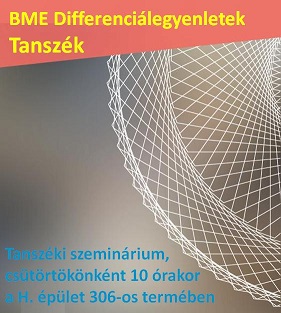Időpont:
2017. 03. 16. 10:15
Hely:
BME H épület 306-os terem
Előadó:
Zsuppán Sándor (Berzsenyi Dániel Evangélikus Gimnázium (Líceum), Sopron)

MEGHÍVÓ
Szeretettel várjuk a Farkas Miklós Alkalmazott Analízis Szemináriumra
2017. március 16. (csütörtök) 10:15, BME H306
Zsuppán Sándor (Berzsenyi Dániel Evangélikus Gimnázium (Líceum), Sopron)
Stokes problem, related inequalities, constants and representations
Stable solvability of the Stokes problem describing fluid motion with small Reynolds number in a domain depends on the inf-sup condition, the discrete version of which is involved in the analysis of many numerical methods. The inf-sup constant figuring in the condition is connected to other domain specific constants figuring in other inequalities such as the Babuska-Aziz inequality for the divergence equation, the Friedrichs-Velte inequality for conjugate harmonic functions and the Korn inequality in linear elasticity. These constants are also connected to the Schur complement operator of the Stokes problem and in the planar case to the Friedrichs operator of the domain. Despite of their theoretical and practical importance exact values of these constants are known only for a few domains. On the other hand there exist useful estimations for planar and spatial domains as well. The values of these constants depend only on the geometry of the domain which is for simply connected planar domains encoded in analytical properties of the conformal mapping of the domain onto the unit disc. Utilization of conformal mapping provides useful results for the constants (exact values or estimations for special domains, and continuous domain dependence) and also for the operators. These results are partly generalizable for other types of domains. We also review some representations of solutions of the Stokes equation by harmonic potentials and formulte results about their equivalence. We also review recent results and outline possible ways for further research of this topic.
(The talk will be in Hungarian.)
---------------------------------------------------------------------------------------------
A szervezők
(Faragó István, Karátson János, Horváth Róbert, Mincsovics Miklós)
A szeminárium honlapja: http://math.bme.hu/AlkAnalSzemi
